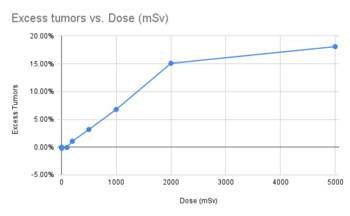Talk:Fear of radiation
LNT Controversy
There is endless debate in social media over whether the Linear No Threshold (LNT) model should be used for accessing public health risks from low levels of radiation. Fig.A is the data of Fig.1 from a 52 year study of Japanese bomb survivors, with added columns for a linear fit and for the predicted excess tumors.
Fig.B is the data re-plotted on a linear scale.
The LNT model is a good fit for exposures above 200mSv, ignoring the highest point, where we might expect some kind of saturation. (A better fit would have the threshold at 100mSv, not zero.)
The controversy is over exposures less than 200mSv. If your exposure is between 5 and 100mSv, LNT predicts your chances of getting cancer are 0.75% higher than the normal 21%. The data from this study shows -0.07% (less cancer, not more).
For those who care about these small risks (regulators and a fearful public) I would say we should think of this as we do about buying a car. If I had to choose between a car I really wanted, and one that had a safety rating a little better (20% chance of an injury in an accident, vs 21%) I would take that extra risk. I might do a little study and find out exactly what the problem is with the car I like, and take steps to avoid that problem.
So on the nuclear power question, if I was considering buying a home I really liked near a nuclear plant or spent fuel storage site, I might do a little study and assure myself that the chances of an accident are small, and then the chances of a radiation leak are even smaller, and then the chances of that leak giving me an exposure like the Japanese bomb survivors are so small that I would better spend my time worrying about getting hit by a meteor. David MacQuigg (talk) 19:42, 16 December 2021 (UTC)
External links are not allowed to exist within articles themselves
External links (to sites outside Citizendium) may go in the reference, and they should definitely go on the External Links tab, but they may NOT exist within the article body itself. Thus, there is a need to revise the Further Reading section. I suggest putting the links in the reference (between <ref></ref> tags) and just the description within the article itself. I know this may be different than you are used to, but it's how online encyclopedias have traditionally done this, including Wikipedia. Let's stick with it.Pat Palmer (talk) 13:41, 27 December 2022 (CST)
- I fixed the first of several links for you, as an example.Pat Palmer (talk) 13:50, 27 December 2022 (CST)
- I agree. Putting the link details in the footnotes makes the text more readable. I fixed the rest of the links. David MacQuigg (talk) 21:12, 27 December 2022 (CST)
a question about LNT
The discussion of LNT has left me scratching my head. Am I right in understanding that the Linear No Threshold (LNT) model is comparable to the conventional wisdom on bee sting reactions, which goes like something like this: "Every time a bee stings you, the venom you get accumulates in your system. A day may come when you get a bee sting that puts you over the threshold for safety and then you'll start having dangerous reactions to bee stings. So every single bee sting is a really really bad thing because you body cannot really eliminate the venom." So is it like, with LNT, "Every little bit of radiation that hits your body accumulates in your body over time", whereas in reality, the body eliminates most radioactive substances (like it eliminates almost everything unneeded) and can usually repair any damage from moderate amounts of radiation, and so it only matters that you not get too much ALL AT ONCE? Instead of worrying about a lifetime of slow accumulation?" As far as I'm concerned, the existing discussions of LNT need to be made more accessible to normal humans who are not scientists. I can't be the only one who just doesn't understand this stuff.Pat Palmer (talk) 10:51, 3 January 2023 (CST)
- The best simple explanation I have found is in Robert Hargraves' lecture slides, linked in our Further Reading section. Maybe we should include more of this in the article. David MacQuigg (talk) 11:59, 3 January 2023 (CST)

